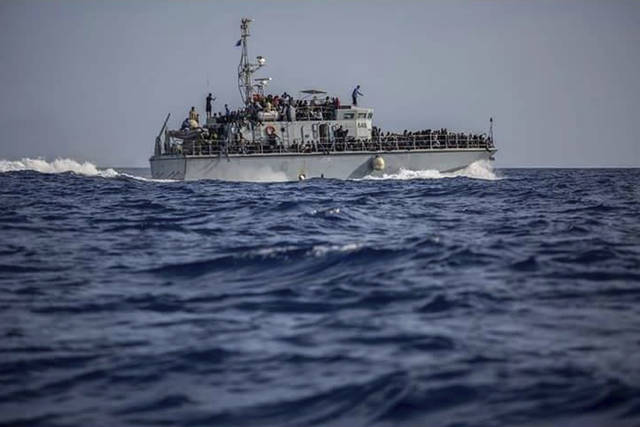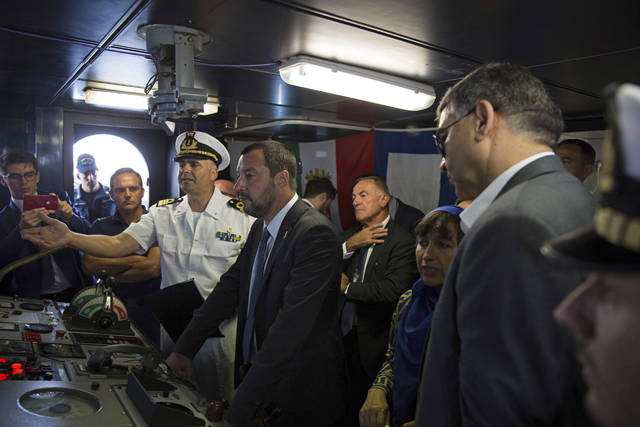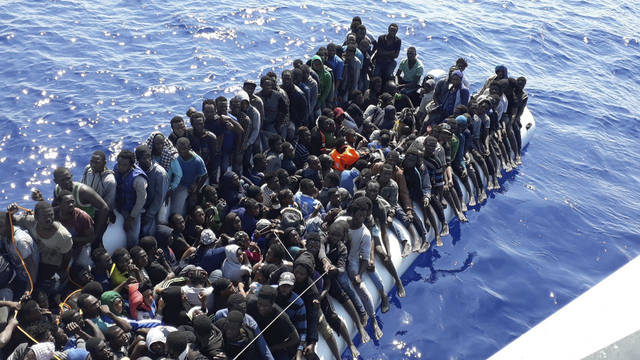ROME — Italy’s firebrand interior minister visited Libya on Monday and returned home emboldened with his decision to close Italian ports to migrants, demanding Europe step in to accept them and help Libya better secure its borders and screen migrants for asylum before they leave home.
Matteo Salvini made his first official visit abroad as interior minister to Tripoli, Libya’s capital, to hammer home his commitment to ending the migration flows that have fueled anti-migrant sentiment across Europe and brought his xenophobic party to power.
He called for U.N.-backed and EU-funded asylum-screening centers to be erected on Libya’s external borders, primarily Chad, Niger and Sudan — not in Libya itself or Italy. And he vowed to help Libyan authorities assume control over their territorial waters, to prevent migrants from leaving and keep European aid groups out of the way.
“This is the point of absolute convergence with Libya: Block the business of clandestine migration,” Salvini told reporters in Rome after he returned home.
Libya was plunged into chaos following the 2011 uprising that ousted and killed longtime dictator Moammar Gadhafi and is now split between rival governments — one, backed by the United Nations, based in Tripoli, and the other in the country’ east — each supported by an array of militias.
Since then, it has been a frequently used as a route to Europe for migrants fleeing poverty and conflict in Africa and the Middle East. Recently, there has been an uptick of migrants leaving from other North African points who have been rescued by Spain in the Straits of Gibraltar.
On Monday, Spain reported it rescued more than 600 people, bringing to 1,400 the number of those rescued in three days. Spanish Interior Minister Fernando Grande-Marlaska is travelling to Morocco on Thursday to discuss the influx.
Libya’s coast guard itself on Sunday rescued some 1,000 migrants, including dozens of women and children in several different rescues. Ahmed Maiteeg, the deputy prime minister of the U.N.-backed Libyan government, told a press conference in Tripoli with Salvini by his side that all of them were given humanitarian and medical aid, and were taken to a naval base in Tripoli and a refugee camp in the town of Khoms.
Salvini praised the Libyans for their “excellent work” and vowed to halt European aid groups that have been rescuing migrants. The Spanish NGO Proactiva Open Arms complained Sunday that its offer of help was declined by Italy after it handed off the rescue to Libya’s coast guard — a decision condemned Monday by Amnesty International which said it would result in the migrants being tortured anew in Libyan detention centers.
Salvini denied migrants were being tortured, branding reports of widespread human rights violations in Libyan centers as “lies and rhetoric.” He said he toured a new U.N.-run facility due to open next month that he said had all the amenities of an Italian migrant holding center.
Italy is committed, he said, to “blocking the full-on invasion of those associations that would like to substitute the government and authorities and in fact help illegal migrant traffickers.”
Salvini has accused these NGOs of operating as taxi services for Libyan-based smugglers and has closed Italy’s ports to their ships, including to the German aid group Mission Lifeline whose rescue vessel has been stranded off Malta since Thursday with 234 migrants aboard.
He challenged France — a loud critic of his anti-migrant policies — to open its port in Marseille to the ship, saying: “There’s a boat full of migrants in Maltese waters that’s waiting to be welcomed.”
Salvini was also asked about criticism stemming from the plight of 100 other migrants on a Danish-flagged container ship, the Alexander Maersk, off Sicily, but deflected questions over the matter.
The International Chamber of Shipping, an industry trade association, has voiced concern about Italy’s crackdown on NGOs, saying it will put a greater burden on commercial merchant ships to conduct rescues which will then have follow-on effects on trade. Salvini said “We’re working on it.”
During his visit, Maiteeg announced a migration and security conference in Tripoli in September, which Salvini readily endorsed.
He promised to return before then to hand over new equipment for Libya’s coast guard and said a technical committee would soon be meeting on Libya’s southern border to assess the creation of asylum-screening “hotspots” to prevent migrants from entering Libya in the first place.
EU foreign policy chief Federica Mogherini urged EU member states to contribute to an Africa trust fund to finance the “hotspots,” mirroring a deal that the EU clinched with Turkey in 2015 aimed at encouraging Ankara to stop refugees setting out for the Greek islands.
Salvini said he thought 6 billion euros ($7 billion) was reasonable for the African “hotspots,” which would be around double the cost of the Turkey deal.
Before Italy’s new coalition government was installed, Italy already worked to bolster the Libyan coast guard’s ability to patrol its coasts and to bring back migrants who launched from its shores.
Human rights organizations have criticized the practice, alleging that migrants are abused in Libya and the North African country hardly constitutes a “safe” port of call, as called for by international law.
———
Associated Press writer Samy Magdy in Cairo contributed to this report.




